Welcome to the week.
These are the most noteworthy items we came across in the past 7 days…
Safe streets for whom?: An excellent article that summarizes the sometimes narrow view of Vision Zero and cycling advocacy and how those approaches often fail to embrace safety justice for all road users.
Big Boost for Black Girls: USA Cycling has announced a major partnership with Black Girls Do Bike (a national org with a chapter in Portland) that includes a racing team, free memberships for members, a coaching program, and more.
Outside isn’t “free” for everyone: Must-read from Bitch Media about the “Twisted racial politics of going outside“.
Whose land are your riding on? A new app and website allows you to enter any zipcode in the world and find out which native people lived on the land. You can also text a city/state to (907) 312-5085 to receive the information.
Air quality argument: Vox argues that the expansive health benefits of cleaner air alone would help pay for a transition away from burning fossil fuels.
We choose to die: We have the tools to dramatically increase the safety of motor vehicles and stop thousands of U.S. traffic deaths every year, but “It turns out that reckless driving presents more of a political challenge than a technical one.”
Advertisement
The planner’s case for VP Harris: Streetsblog California has the story of how U.S. Senator and VP candidate Kamala Harris took a political risk to prevent a highway-centric planning effort from taking root in San Diego.
Time for the Third Lane: The CEO of micromobility firm Bird says it’s time to embrace a major shift in how we allocate road space by having less car parking and more room for scooter and bike share users.
E-bikes are taking over: A story from Denver about how electric bike sales are skyrocketing could be written about so many cities across the country right now. E-bikes are revolutionary machines!
“Good luck finding one”: The bike boom wouldn’t have crimped product availability nearly as much if it weren’t for the terrible timing of Trump’s China tariffs.
Bikewashing: Bikes are icons of the climate change fight, but professional cycling (and all the miles people drive to ride) has a massive carbon footprint and is largely sponsored/subsidized by automakers.
Ride it like you stole it: A Japanese man stole a bike and rode it over 600 miles to visit Tokyo before police caught up with him.
— Jonathan Maus: (503) 706-8804, @jonathan_maus on Twitter and jonathan@bikeportland.org
— Get our headlines delivered to your inbox.
— Support this independent community media outlet with a one-time contribution or monthly subscription.



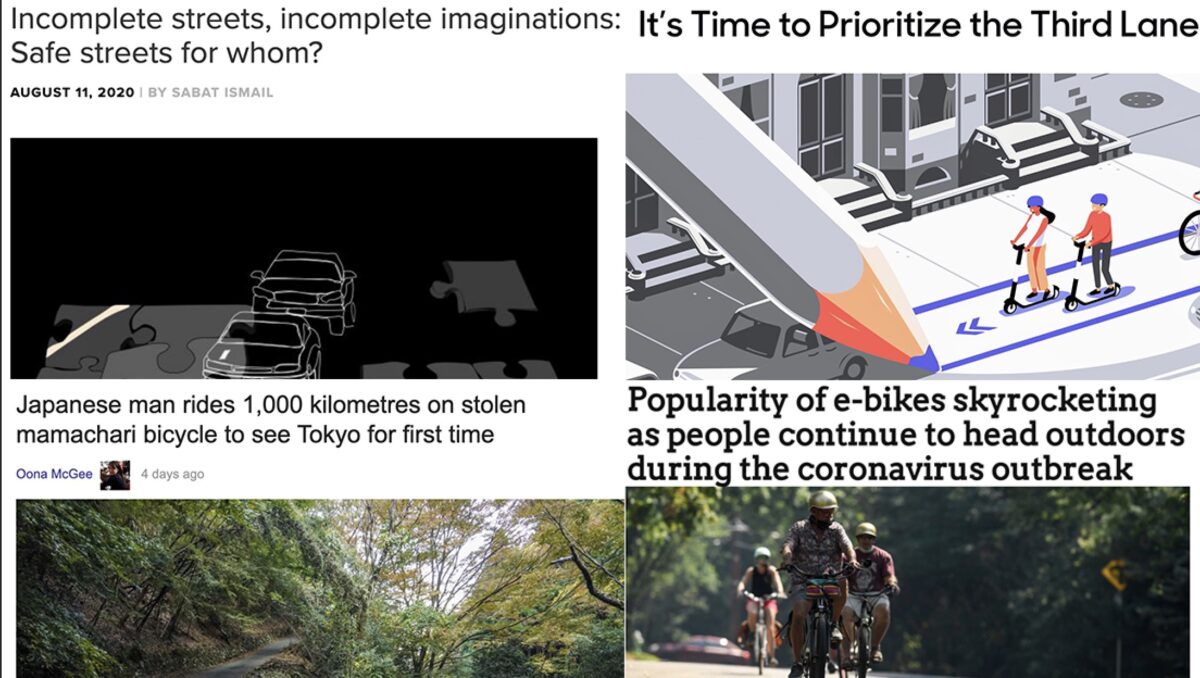
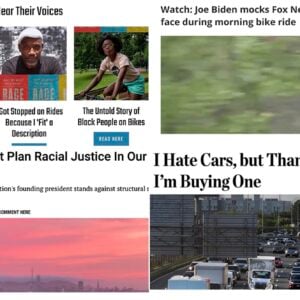
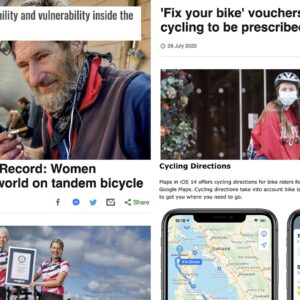
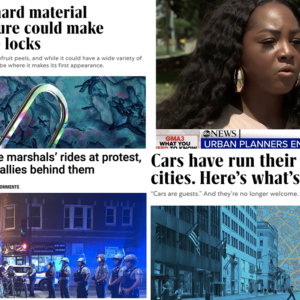
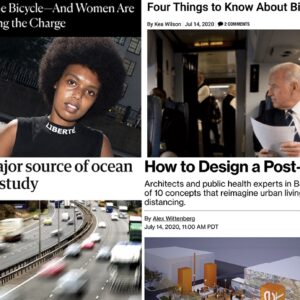
Thanks for reading.
BikePortland has served this community with independent community journalism since 2005. We rely on subscriptions from readers like you to survive. Your financial support is vital in keeping this valuable resource alive and well.
Please subscribe today to strengthen and expand our work.
It seems like quite a stretch to blame the concerns about overcrowding in the outdoors on racism and the article does not present any objective evidence that is what is happening. Everyone I know (including friends that are POC) that enjoys the outdoors are saying that every trailhead and natural area is over-run with people due to the Covid Crisis at the moment. There is no way I’m going to go to any popular trail or natural area this summer because I am looking for a more peaceful experience. Gorge – nope. Mt Hood – nope. If you have been to Yosemite, Zion, Yellowstone, etc. in the last 5 years you will have noticed they are overused and the problem is white people and tourists from Europe/Asia. It is not a race problem it is supply and demand issue. It is a hard concept for some to understand but it is possible to be happy that a racist (Muir) helped preserve natural wonders but unhappy he was a terrible person. I can be happy with some of Pres. Clinton’s work but be unhappy that he sexually harassed an intern. Things that were acceptable in the past are not acceptable now. That does not mean that everyone in the past was a completely terrible person. What do you think the largely church based civil rights movement would have thought of gay marriage? Look up Bayard Rustin if you have any question. Just because many of the civil rights leaders were not supporters of gay people that does not mean they were wrong on civil rights for black people.
That’s my take as well. But with white people falling on their swords every chance they get, they’ll take a story like that and run with it. I’ve already had enough of these so called “allies” throwing bricks through windows on my behalf. No thank you! Stay out of our way and go home. Peace.
I am sure they know what is better for you 🙂
I’ve never understood the motivation to “cancel” someone from the past based on their personal views. Muir is a great example: does the fact that he was a “terrible person” have any bearing on the great service be did for the country?
Will future generations “cancel” today’s leaders because, for example, they eat meat and contribute to climate change?
I think that it will be fair for future peoples to cancel lifted pickup truck drivers. The danger, waste and foolishness of such devices will baffle future earth dwellers, and lead to them and those that own them being viewed with scorn and contempt.
I can imagine a bunch of 19th century pioneers on the Oregon Trail sitting around a campfire, debating the relative merits of high-floor wagons versus low-floor – better clearance while fording rivers with the high-floors, more space and capacity with the low-floors. But which one looks cooler?
I think I saw that on an episode of “Little House” long ago. Definitely low-floor for the lumber run to Mankato, but high-floor for taking nitro over the mountains in Winter…I don’t think looking cooler came up.
In the future, we will eat vegans.
If you eat hamburger, you already do.
John Muir is one of the “founding fathers” of the Sierra Club and I do not think you can separate his views on Indigenous people from his conservation activism. So it seems appropriate for the Sierra Club to reckon with his racism, especially since it remains a largely white group today.
What does it mean for the organization to “reckon with his racism”?
sorry just saw this–for a long time the writing about Muir by present day conservationists bordered on hagiography.
I think reckoning with his racism means updating the Sierra Club’s internal history to account for how his perspective on the western wilderness was quite derogatory toward Indigenous people. It also involves reviewing the personnel and programs of the current club to see how it can become more welcoming to the people its forefathers looked down on.
I assume you’re talking about the “Outside isn’t “free” for everyone” article which states that POC have less available outdoor space to use. Couple that with stats showing POC have higher COVID infection rates.
Sure, it’s not a causation study but that connection was enough objective evidence for me to base the article off of.
I love that map. Thanks.
One note about the First Nations map: its a static representation of nations around the 1700s. Over time the locations/borders between First Nations changed. When we did our recent post about the lands our new trails are on ( https://www.facebook.com/cuyunalakesmtb/posts/3215058565236572 ), we run into a issue of sources. Even First Nations historians admitted they were largely going off of what Europeans wrote down.
It does get tricky. There were surely people before these. How far back do you go to determine the first? The first people to make it to the Americas were from Asia. Is all of Europe Roman or the groups before that? Ultimately everyone living outside of East Africa is a immigrant.
True. For example, the Sioux (Dakota) were originally settled woods Indians from eastern Illinois, and were only able to become nomadic hunters after they got and bred horses, and guns, from the Spanish in the 1600s. Imagine North American natives without horses!
And then of course there were the Vikings in Greenland and Newfoundland, from about 980 to 1400…
I guess that is the downside of not having any written languages before contact with the European powers. The lack of steel, firearms, and immunity to the rest of the world’s germs was also bad news for the people that lived in the Americas before the Euros arrived also. It will be interesting to see what happens to humans if we ever come across another civilization from outside our solar system that is more advanced than we are. I’m guessing based on our history it won’t work out very well for us.
Why should a PR piece from Bird’s CEO be on Bikeportland? I get that he is advocating for a lane that would benefit bikes, but the source is not worthwhile and doesn’t reflect advocacy. This is corporatism that will use public funds and taxes for their own profits. Bird is not a share, it’s a per minute service.
Hi Brendan. BikePortland is a news business. We are not an advocacy group. Sorry if that wasn’t clear. I post things that are noteworthy for a variety of reasons. A link to something here doesn’t = endorsement or agreement.
If you are a news business why didn’t you cover the news about the guy who got beat up by the protesters? You covered the protesters before, why not now?
Mike! it seems like you have a valid question for the Publisher, but no single blog, paper, or zine will cover all threads of all stories on all topics. The guy-who-got-beat-up-by-protesters story (of which there are many) may not have made the Inform and Inspire threshold. Please share a link another News Business if you would like to illuminate something you or showing the continuity you presume applies.
One word. Narrative.
He wasn’t riding a bike.
Audi Ad kept popping Up awhile trying to read the “Bike Washing/TDU” story from Gardian- gotta love it
“Good luck finding one”: The China tariffs are a minor, if inconvenient and untimely, cause of the current bike and parts shortage, a convenient scapegoat if you will. The fact is that sales in the USA for new bicycles have been declining for decades, so much so that there are half as many bike shops today as there were 20 years ago according to BRAIN (Bicycle Retail And Industry News). Why would we increase imports of a product that no one wants to buy? Up until April of this year the trend was continuing, and then quite suddenly everyone wanted a bike.
Approximately 99% of all new bikes and parts sold in the USA are imported, including department store bikes, Surly, Trek, Specialized, Salsa, Brompton, etc. In the 80s, cheap (the crappy and the high-quality) bikes and parts came from Japan, but their wages rose, and Taiwan was the cheap producer in the 90s, then mainland China. Now it’s Vietnam, Malaysia, and even India. We still get a lot of bikes from China, but the parts are generally from elsewhere. And there’s simply fewer of them going to the USA versus all the other markets out there, including to China’s rapidly growing middle class who want and are willing to pay for the best, as are consumers in India, Turkey, Indonesia, and other rapidly developing countries.
The fact is, the USA is no longer the center of the consumer universe, and it’s only been this year with the various shortages that most US consumers have started to realize it. And most journalists are, at heart, ignorant middle-class consumers who will believe anything they are told, without doing even the most basic research on their story (except our very own JM, of course).
“Good luck finding one”: I would tariff China a LOT more if I could.